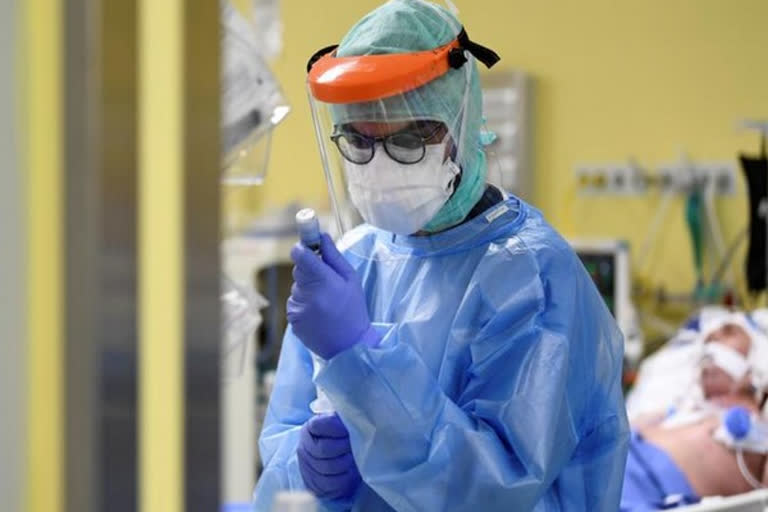Hyderabad: World Day for Safety and Health at Work is observed every year on 28 April to promote safety and health in the workplace and those who lost their lives from work-related injury or illness at workplace, Worker's Memorial Day honours them.
World Day for Safety and Health at Work is an awareness-raising campaign that aims to make work safe and healthy.
Recognizing the great challenge that governments, employers, workers and whole societies are facing worldwide to fight the COVID-19 pandemic, the World Day for Safety and Health at Work will focus on addressing the outbreak of infectious diseases at work, in particular, on the COVID-19 pandemic.
The aim is to stimulate national tripartite dialogue on safety and health at work. The International Labour Organization is using this day to raise awareness on the adoption of safe practices in workplaces and the role that occupational safety and health (OSH) services play. It will also focus on the medium to long-term, including recovery and future preparedness, in particular, integrating measures into OSH management systems and policies at the national and enterprise levels.
Occupational safety and health can be important for moral, legal, and financial reasons. All organisations have a duty of care to ensure that employees and any other person who may be affected by the companies undertaking remain safe at all times. Moral obligations would involve the protection of employee's lives and health. Legal reasons for OSH practices relate to the preventative, punitive and compensatory effects of laws that protect worker's safety and health.
Getting your workplace ready for COVID-19
- Make sure your workplaces are clean and hygienic
- Promote regular and thorough hand-washing by employees, contractors, and customers
- Promote good respiratory hygiene in the workplace
- Advise employees and contractors to consult national travel advice before going on business trips.
Key considerations to prevent or reduce COVID-19 risks
BEFORE the meeting or event
Check the advice from the authorities in the community where you plan to hold the meeting or event. Follow their advice.
Develop and agree a preparedness plan to prevent infection at your meeting or event.
Develop and agree a response plan in case someone at the meeting becomes ill with symptoms of COVID-19 (dry cough, fever, malaise).
During the meeting or event
Provide information or a briefing, preferably both orally and in writing, on COVID-19 and the measures that organizers are taking to make this event safe for participants.
Display dispensers of alcohol-based hand rub prominently around the venue.
If there is space, arrange seats so that participants are at least 1 meter apart.
Open windows and doors whenever possible to make sure the venue is well ventilated.
If anyone who starts to feel unwell, follow your preparedness plan or call your hotline.
AFTER the meeting
Retain the names and contact details of all participants for at least one month. This will help public health authorities trace people who may have been exposed to COVID-19 if one or more participants become ill shortly after the event.
If someone at the meeting or event was isolated as a suspected COVID-19 case, the organizer should inform participants. They should be advised to monitor themselves for symptoms for 14 days and take their temperature twice a day.
If they develop even a mild cough or low-grade fever (i.e. a temperature of 37.3 C or more) they should stay at home and self-isolate. This means avoiding close contact (less than 1 meter) with other people, including family members. They should also call their health care provider or the local public health department, giving them details of their recent travel and symptoms.
Thank all the participants for their cooperation with the provisions in place.
Before travelling
Make sure your organization and its employees have the latest information on areas where COVID-19 is spreading
Based on the latest information, your organization should assess the benefits and risks related to upcoming travel plans.
Avoid sending employees who may be at higher risk of serious illness (e.g. Older employees and those with medical conditions such as diabetes, heart and lung disease) to areas where COVID-19 is spreading.
Make sure all persons travelling to locations reporting COVID-19 are briefed by a qualified professional (e.g. staff health services, health care provider or local public health partner)
Consider issuing employees who are about to travel with small bottles (under 100 CL) of alcohol-based hand rub. This can facilitate regular hand-washing.
While traveling:
Encourage employees to wash their hands regularly and stay at least one meter away from people who are coughing or sneezing
Ensure employees know what to do and who to contact if they feel ill while traveling.
Ensure that your employees comply with instructions from local authorities where they are traveling. If, for example, they are told by local authorities not to go somewhere they should comply with this.
Your employees should comply with any local restrictions on travel, movement or large gatherings.



